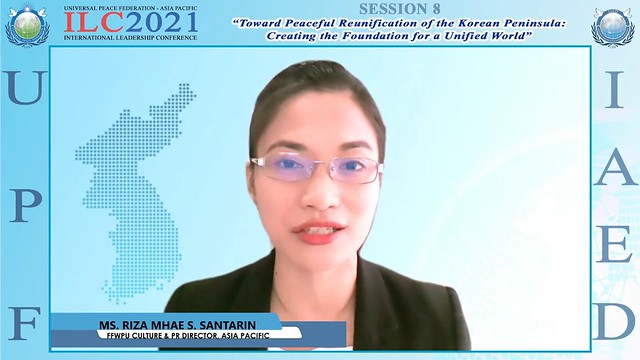Asia Pacific—The International Association for Peace and Economic Development (IAED) hosted Session Nine of the ILC2021—Asia Pacific program, which took place on May 1, 2021. Speakers from different economic sectors of Australia, China, India, the Marshall Islands and Tajikistan presented their perspectives on the theme, “The Role of Business Leaders for a Peaceful Asia Pacific Region.” Specifically, they stressed the valuable relationship between economic growth and peace and the importance of nations engaging in peaceful dialogue and having good trade relations. This will not only be beneficial for the two Koreas but also for peace-building among Asia Pacific nations and in the world.
Over 2,116 people from 44 nations registered for the event and 642 people attended it by Zoom. The sessions were translated into nine languages and broadcasted on various social media platforms, garnering thousands of viewers.
Mr. Thomas McDevitt, vice chairman of the HJ Magnolia Global Foundation and global coordinator of IAED, warmly welcomed the speakers and attendees in his opening remarks. He introduced the IAED as a primary association of UPF and spoke about its efforts in building a network of business leaders committed to driving economic development toward establishing a global environment of interdependence and mutual prosperity.
Mr. Stephen Killelea, founder of the Institute for Economics and Peace, a world renowned think tank in Australia which produces the Global Peace Index, spoke about the interconnection between economic growth and peace and how both can form a virtuous cycle. He explained that as peace improves, macroeconomic indicators improve: the GDP growth rate increases, the inflation rate decreases, access to financing becomes easier, foreign direct investment increases, and the currency exchange rate strengthens. Likewise, the same factors that build peace will also create an environment for many other things to thrive, such as businesses, social well-being, environmental performance and so forth. Mr. Killelea also said that the peaceful reunification of the two Koreas should be grounded on mutual economic development. Not only will that bring interdependence, but also national development, easing poverty and increasing overall personal and social well-being.
Mr. Parth Sharma, secretary-general of the ROK Friendship Society in India, focused on the business perspective of the imperative for reunification of North and South Korea, which he predicts and ardently hopes will happen in the near future. He highlighted why reunification is necessary and why it will work. When that time comes, many resources, including defenses and people, will be deployed and released by both countries. He also spoke about the Shinyang fund, which is primarily focused on areas, such as commodities and labor-intensive business, which will come into play when reunification happens. Mr. Sharma shared that this investment under the reunification objective will be an opportunity for a lifetime of peace and mutual understanding between the two nations and even in the world.
Mr. Jim Philippo, vice general manager of TOBOLAR (National Cobra Company), Marshall Islands, asserted that true economic trade could be the start to true lasting peace. With economic viability and feasibility, the “no trade barrier” among nations in the Asia Pacific Rim and the world would be established. Naturally, this would be an avenue for pure and true competition which will improve the development of each nation and in turn lay the foundation for building peace. Mr. Philippo further expounded that if economic activity increases between the two Koreas through practicing true values and principles that support good trade and uplifts the economic standard of their citizens, it would be the key that unlocked the door to reconciliation and lasting peace between the two nations.
Mrs. Nasiba Mirpochoeva, a social entrepreneur from Tajikistan, affirmed that any crisis can be resolved through peaceful dialogue. She said that the first steps to peace-building are breaking stereotypes and accepting new ideas by establishing peaceful communication lines and using soft power skills. She stressed that this is not only the responsibility of diplomats but all global citizens, since peace-building starts with oneself.
The last speaker, Dr. Yang Qing, vice president of Shenzhen Shinewell Energy Group and Shenzhen QiLu Industry in China, spoke about the importance of people’s health as it affects every nation’s economy, especially now during the COVID-19 pandemic. He stated that economic recovery depends on social stability, which relates to the physical and mental health of the people. The health of the people can also be determined by the health care system and education standards of a nation. Dr. Qing said that nations in the Asia Pacific should work closely to share data, methods and results to provide viable protection to and solutions for their people. In that way, the region can emerge from the gloom of the pandemic and re-lead the world economy.
During the program, the attendees had the opportunity to actively engage with the panelists in the Q&A session facilitated by Dr. Venus Agustin, president of the International Peace Leadership College and vice president of the World Tong-Il-Moo-Do Martial Arts Federation. During the session, the development of new business models for peace and strategic free trade platforms that transcend cultural and ideological differences between nations were discussed.
Closing remarks were given by Mr. Masatate Kajikuri, coordinator of IAED-Asia Pacific and the CEO of Smart Rich Co., Ltd. He conveyed his aspiration that the IAED network will contribute greatly to the economic development of the Asia Pacific.
The session was moderated by Ms. Riza Mhae S. Santarin, culture and PR director of UPF-Asia Pacific.

